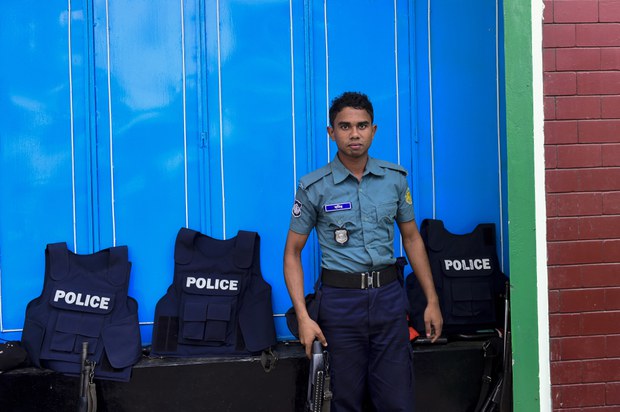Bangladesh Police Will Meet with Islamic Leaders to Thwart Extremists
2015.12.16
 A Bangladeshi police officer stands guard in front of a Shiite mosque in Dhaka after authorities increased security following an attack on a Shiite mosque in Bogra, Nov. 27, 2015. Police and Islamic leaders will meet Thursday to discuss efforts to counter terrorism.
A Bangladeshi police officer stands guard in front of a Shiite mosque in Dhaka after authorities increased security following an attack on a Shiite mosque in Bogra, Nov. 27, 2015. Police and Islamic leaders will meet Thursday to discuss efforts to counter terrorism.
Bangladesh police seeking support for countering terrorism and extremism will meet with Islamic leaders on Thursday, following an onslaught of militant attacks since late September.
Maulana Farid Uddin Masud, president of the Bangladesh Jamiatul Ulama-e-Islam, and Islamic leaders representing Qawmi madrassas will meet the inspector general of police and other officials in Dhaka to discuss counterterrorism strategies.
“We are holding the meeting tomorrow at the police headquarters as we need their support to thwart the extremists’ move to mislead the innocent young people through misinterpretation of Islam,” Police Inspector-General A.K.M. Shahidul Hoque told BenarNews on Wednesday.
Law enforcers are planning more meetings with Islamic clerics since they can reach out to many people through their sermons.
“Even I have told the honorable prime minister that people would not pay heed to your Islamic sermons. People will believe the anti-militant message of Islam if we say so,” Masud told BenarNews on Wednesday. He was alluding to a previous meeting with Prime Minister Sheikh Hasina, who had sought support from Islamic leaders against militants.
Islamic State, local militants are enemies of Islam
Home-grown militants who subscribe to extremism similar to the one espoused by the Middle East-based Islamic State (IS) have been killing people and targeting minorities through the misinterpretation of Islam, which is a peaceful religion, Masud said.
“There is no difference between the IS and the home-grown militants such as Jamaat-ul-Mujahideen Bangladesh, Harkat-ul-Jihad al-Islami, Ansarullah Bangla Team, Hizbut Tahrir and other extremist groups. They are the enemies of Islam and Muslims,” he said.
Since late September, Bangladeshi officials have repeatedly denied that IS has a presence in the country, although the extremist group claimed responsibility for a series of attacks, including the mu
In early October, a priest in northern district of Pabna suffered a knife attack while another priest in Dinajpur was shot by militants in November. A bomb blast killed two minority Shiite Muslims during an October religious procession. The iman of a Shiite mosque in Bogra district was killed in November when gunmen sprayed bullets on praying Muslims.
In December, members of the JMB allegedly attacked two Hindu temples in Dinajpur in a gap of five days.
Additionally, three police were attacked during separate security checks, killing two and seriously injuring the third. Militants also attacked two publishing houses on Oct. 31 in Dhaka, killing a publisher, Faisal Arefin Dipan, for publishing a book of a slain blogger Avijit Roy, and injuring three others.
Italian aid worker Tavella Cesare was gunned down Sept. 28 in Dhaka and Japanese agriculture researcher Kunio Hoshi was shot and killed less than a week later in northern Rangpur district.
The Islamic State claimed responsibility for most of the incidents, according to SITE, a U.S.-based jihadi threat monitoring group. The government continues to reject the presence of IS in Bangladesh, saying local groups use the IS brand to add value to their names.







